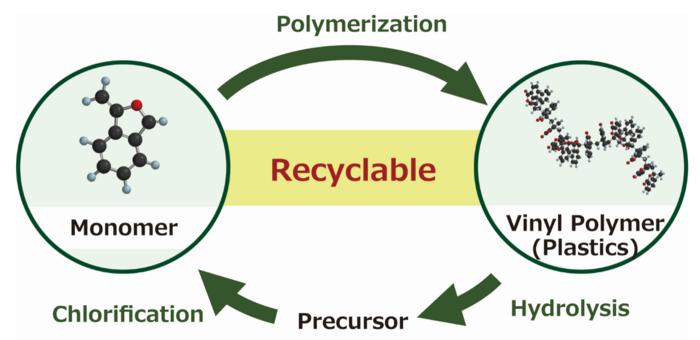Chemical recycling of widely used vinyl polymers (VPs) is one of the key technologies required for realizing a sustainable society. In this regard, a team of researchers from Shinshu University have recently reported a new chemical process that facilitates the depolymerization of cyclic styrene-based VPs, resulting in the recovery of a monomer precursor. This highly efficient chemical recycling system can help with effective resource circulation and the development of new plastic recycling technologies.

Credit: Yasuhiro Kohsaka from Shinshu University
Chemical recycling of widely used vinyl polymers (VPs) is one of the key technologies required for realizing a sustainable society. In this regard, a team of researchers from Shinshu University have recently reported a new chemical process that facilitates the depolymerization of cyclic styrene-based VPs, resulting in the recovery of a monomer precursor. This highly efficient chemical recycling system can help with effective resource circulation and the development of new plastic recycling technologies.
Vinyl polymers (VPs) are one of the most widely used plastic materials. They are found everywhere, from poly(vinyl chloride) pipes and surgical gloves to disposable polystyrene plates. Given the global call for a move towards sustainability, would it not be great to chemically recycle this widely used polymer for realizing a sustainable society?
Recently, a team of researchers led by Associate Professor Yasuhiro Kohsaka from the Faculty of Textile Science and Technology (FTST) and Research Initiative for Supra-Materials (RISM), both at Shinshu University, undertook a study to find a way out for achieving this. In their recent breakthrough published online in ACS Macro Letters on 27 November 2023 and co-authored by Yota Chiba from the FTST at Shinshu University, the team presented a new strategy for effectively depolymerizing the VPs of cyclic styrene derivatives to retrieve a monomer precursor.
Traditionally, chemical recycling of VPs has always been challenging. The conventional approach to recycling any polymer is reversing the polymerization process, which entails breaking a single large molecule made up of repeating monomeric units down to its parent monomeric components. Depolymerizing VPs is difficult because the covalent carbon–carbon bonds holding together the monomer units are very stable and therefore tough to break. Studies have proposed ways to break the carbon–carbon backbone of VPs, but most of them fail to ensure quantitative and selective scission (bond breaking) of its main chain, which is crucial to the effective recovery of monomers.
“Polymers that are stable have poor recyclability, and the ones that are easily recyclable are unstable in nature,” says Dr. Kohsaka. “We overcame this trade-off by forgoing conventional strategies that try to reverse the polymerization reaction to recover monomers and developing a two-step recycling process. In the first step, degradation of the polymer to a monomeric precursor was achieved, which was followed by the recovery of the monomer by chemical modification.”
The team chose VPs made of cyclic α-substituted styrene derivatives, such as 3-methylene phthalide, as their molecule for testing chemical recyclability and investigating the ring-opening reaction of the pendant groups in the presence of a base like sodium hydroxide. They found that the opening of the rings due to saponification increased the steric hindrance around the pendant groups, which led to main-chain scission and depolymerization of the VP into monomer precursors. These recovered precursors were then converted to monomers via single-step chlorination and spontaneous intramolecular esterification. The researchers further discovered that the same cyclic monomer structure that facilitated depolymerization was also responsible for promoting polymerization owing to reduced steric hindrance around the vinylidene group. These findings led the researchers to conclude that cyclic α-substituted styrene derivatives have the potential for chemical recycling.
At a broader level, this study has opened new avenues for resource circulation, one of the foundational pillars of a sustainable society, by providing a facile method of polymerization and depolymerization of ubiquitous VPs. The researchers believe that their findings can provide useful fodder for further research on not just the depolymerization of plastic materials but also the development of new recyclable plastics.
“The aim of our research was to aid the mission of developing efficient plastic recycling technology, which is a tool that humanity desperately needs against the backdrop of environmental pollution caused by plastics. While we cannot remove all the plastic that already exists on this planet, we can at least make the best use of plastic resources available to us with our new chemical recycling strategy,” concludes Dr. Kohsaka.
###
About Shinshu University
Shinshu University is a national university founded in 1949 and located nestling under the Japanese Alps in Nagano known for its stunning natural landscapes. Our motto, “Powered by Nature – strengthening our network with society and applying nature to create innovative solutions for a better tomorrow” reflects the mission of fostering promising creative professionals and deepening the collaborative relationship with local communities, which leads to our contribution to regional development by innovation in various fields. We’re working on providing solutions for building a sustainable society through interdisciplinary research fields: material science (carbon, fiber and composites), biomedical science (for intractable diseases and preventive medicine) and mountain science, and aiming to boost research and innovation capability through collaborative projects with distinguished researchers from the world. For more information visit https://www.shinshu-u.ac.jp/english/ or follow us on X (Twitter) @ShinshuUni for our latest news.
Journal
ACS Macro Letters
DOI
10.1021/acsmacrolett.3c00573
Method of Research
Experimental study
Subject of Research
Not applicable
Article Title
Chemically Recyclable Vinyl Polymers by Free Radical Polymerization of Cyclic Styrene Derivatives
Article Publication Date
27-Nov-2023
COI Statement
The authors declare no competing financial interest.




